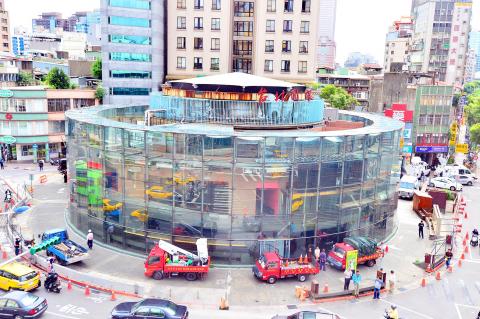The Taipei City Government yesterday started the demolition of Jiancheng Circle (建成圓環) in the Dadaocheng (大稻埕) area.
The Taipei Market Administration Office said that the demolition would cost about NT$2.5 million (US$78,304) and should be completed by February.
The structure is to be converted into a park, with a reservoir below the circle, which has been declared a historical structure, to be preserved, the office said.

Photo: Wang Yi-sung, Taipei Times
Taipei Department of Culture Chief Secretary Liu Te-chien (劉得堅) said that a plan to preserve the reservoir would be submitted next month to the Taipei Cultural Assets Assessment Committee for review.
The Taipei Park and Street Lights Office, which is to oversee work on the park, said the facility has a NT$19 million budget and is scheduled to be completed in July.
“Time rolls on and some things are bound to become memories,” Taipei Mayor Ko Wen-je (柯文哲) said, when asked to comment on the demolition on the sidelines of an event to promote next year’s Summer Universiade.
The structure had been rebuilt from a night market into an indoor food court during former president Ma Ying-jeou’s (馬英九) term as Taipei mayor, which cost NT$200 million, Ko said.
“I am not saying that he had been negligent, but he built something strange, so much so that [the city government] could not figure out how to improve its functionality, and it had become a mausoleum,” he said.
In 1908 the circle was a bustling market and, from the 1950s to early 1990s, a night market, until it fell into disuse after the main building burned down in two separate fires in 1993 and 1999.
In an attempt to modernize the decades-old market, Ma in 2001 ordered the demolition of the food circle and built a two-story cylindrical glass building that opened in October 2003.
However, the modern building did not appeal to food vendors, residents or tourists.
A Taipei resident, surnamed Cheng (鄭,) said he used to frequent the facility with friends when it was a night market, but has not visited in more than 10 years.
Though he feels somewhat nostalgic that the modern structure is being torn down, it is about time that the facility be removed so that the land can be put to better use, Cheng said.

CHAOS: Iranians took to the streets playing celebratory music after reports of Khamenei’s death on Saturday, while mourners also gathered in Tehran yesterday Iranian Supreme Leader Ayatollah Ali Khamenei was killed in a major attack on Iran launched by Israel and the US, throwing the future of the Islamic republic into doubt and raising the risk of regional instability. Iranian state television and the state-run IRNA news agency announced the 86-year-old’s death early yesterday. US President Donald Trump said it gave Iranians their “greatest chance” to “take back” their country. The announcements came after a joint US and Israeli aerial bombardment that targeted Iranian military and governmental sites. Trump said the “heavy and pinpoint bombing” would continue through the week or as long

TRUST: The KMT said it respected the US’ timing and considerations, and hoped it would continue to honor its commitments to helping Taiwan bolster its defenses and deterrence US President Donald Trump is delaying a multibillion-dollar arms sale to Taiwan to ensure his visit to Beijing is successful, a New York Times report said. The weapons sales package has stalled in the US Department of State, the report said, citing US officials it did not identify. The White House has told agencies not to push forward ahead of Trump’s meeting with Chinese President Xi Jinping (習近平), it said. The two last month held a phone call to discuss trade and geopolitical flashpoints ahead of the summit. Xi raised the Taiwan issue and urged the US to handle arms sales to

BIG SPENDERS: Foreign investors bought the most Taiwan equities since 2005, signaling confidence that an AI boom would continue to benefit chipmakers Taiwan Semiconductor Manufacturing Co’s (TSMC, 台積電) market capitalization swelled to US$2 trillion for the first time following a 4.25 percent rally in its American depositary receipts (ADR) overnight, putting the world’s biggest contract chipmaker sixth on the list of the world’s biggest companies by market capitalization, just behind Amazon.com Inc. The site CompaniesMarketcap.com ranked TSMC ahead of Saudi Aramco and Meta Platforms Inc. The Taiwanese company’s ADRs on Tuesday surged to US$385.75 on the New York Stock Exchange, as strong demand for artificial intelligence (AI) applications led to chip supply constraints and boost revenue growth to record-breaking levels. Each TSMC ADR represents

State-run CPC Corp, Taiwan (CPC, 台灣中油) yesterday said that it had confirmed on Saturday night with its liquefied natural gas (LNG) and crude oil suppliers that shipments are proceeding as scheduled and that domestic supplies remain unaffected. The CPC yesterday announced the gasoline and diesel prices will rise by NT$0.2 and NT$0.4 per liter, respectively, starting Monday, citing Middle East tensions and blizzards in the eastern United States. CPC also iterated it has been reducing the proportion of crude oil imports from the Middle East and diversifying its supply sources in the past few years in response to geopolitical risks, expanding